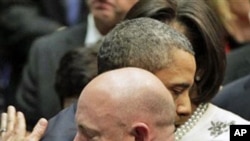President Barack Obama finds himself in the role of national healer-in-chief in the aftermath of the shooting spree in Arizona Saturday that left six people dead and several others wounded, including Congresswoman Gabrielle Giffords.
Commentators say it may be the most impassioned speech of President Obama’s term to date.
“We mourn with you for the fallen. We join you in your grief,” said the president.
Mr. Obama joined thousands of others at a college sports arena in Tucson, Arizona, to honor those killed last week and to inspire a measure of healing in a country often divided by polarized political rhetoric.
Many presidents have demonstrated leadership during times of national sadness and mourning. Ronald Reagan did it in 1986 in the aftermath of the explosion of the Space Shuttle Challenger that killed seven astronauts.
“We will never forget them, nor the last time we saw them this morning as they prepared for their journey and waved goodbye and slipped the surly bonds of Earth to touch the face of God,” President Reagan said.
It happened again in 1995 when then President Bill Clinton appealed for unity in the wake of the bombing of the federal building in Oklahoma City, the worst act of domestic terrorism in U.S. history.
“When there is talk of hatred, let us stand up and talk against it. When there is talk of violence, let us stand up and talk against it,” he said.
Many politicians from across the U.S. political spectrum have joined the president in appealing for unity and empathy in the wake of the Arizona tragedy including the new Speaker of the House, Republican Congressman John Boehner of Ohio.
“The strength to grieve with the families of the fallen, to pray for the wounded and to chart a way forward no matter how painful and difficult it may be,” said Boehner.
But amid the appeals for unity and calm, a debate over heated political rhetoric and its dangers also continues to rage.
Former Alaska Governor Sarah Palin, a possible Republican presidential contender next year, issued a video response to critics who argued that some of her rhetoric during last year’s congressional election campaign was too strident.
“After this shocking tragedy, I listened at first puzzled, then with concern and now with sadness to the irresponsible statements from people attempting to apportion blame for this terrible event,” Palin said.
In his speech in Arizona, President Obama said the shooting was not the result of a lack of civility in political discourse. But he also said that striving for a more civil and empathetic atmosphere of political debate would be a fitting tribute to the victims of Saturday’s shooting spree.
“At a time when we are far too eager to lay the blame for all that ails the world at the feet of those who happen to think differently than we do, it is important for us to pause for a moment and make sure that we are talking with each other in a way that heals, not in a way that wounds,” he said.
That sentiment is endorsed by Scot Faulkner, a lifelong Republican who worked both for former President Ronald Reagan and for the Republican majority in the House of Representatives in the 1990’s.
“Tucson is hopefully a wake-up call just in general that the level of rhetoric has gotten increasingly nasty over the last couple of decades. The partisan prism has really poisoned America," said Faulkner. "I mean, you go back to the 1980’s and Tip O’Neill [former Democratic House Speaker] and [former President] Ronald Reagan would be at each other’s throats rhetorically, but then they would go out as two Irishmen and have a drink together. And that is the key is that everyone understood you can be passionate without being personal.”
For now, political passions seemed to have cooled somewhat in the aftermath of the tragedy in Arizona, at least compared to the heated and divisive political rhetoric of last year’s congressional election campaign.
But University of Virginia political scientist Larry Sabato says don’t expect it to last too long.
“Well, a unifying moment is the right to put it, with the emphasis on the word moment. You know, we have had a lot of these situations with the assassinations through the years, and Oklahoma City and 9-11 [2001 terrorist attacks]," Sabato said. "And for a while we do lower our voices. But America has a pretty rip-roaring [spirited] democracy and I doubt that people will be restrained for very long.”
A new poll by the USA Today newspaper and the Gallup organization found that most Americans reject the notion that heated political rhetoric contributed to the Arizona shooting in any way. In addition, only about one in five people in the same poll believe that tighter gun controls would have prevented the mass shooting.
Obama Steps into National Healer Role




